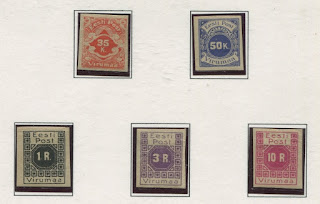Estonia Phantoms
Bud's Big BlueBud's Observations
If you’re building a collection by pillaging feeder albums,
as I have, occasionally you’ll encounter phantoms. The previous owners, not
knowing what else to do, stuck them in BB’s blank spots or laid them between
pages. Some phantoms, the mischievous frauds, mean only to bilk unsuspecting
collectors. Some want to cheat on postal rates. But the subversive sort aim to wreak
political havoc.
What intentions did the five shown above have? When they
first appeared in 1918-19, many thought they were genuine. Scott lists but then
quickly withdraws them and, in a monthly journal, labels them “bogus” with the
warning, “Collectors will be well advised to have nothing to do with them.”
Conjectures
about their origins, nevertheless, proliferated. Did a German speculator create
them for personal gain? Did bolshevists print them to legitimate their attempts
to gain control? Was someone trying to subvert the newly founded Estonian
postal authority? Why is “Virumaa,” an ancient region of Estonia, inscribed?
Who knows?
I like such mysterious phantoms and happily include them on
supplement pages. Phantoms ought to be considered a part of postal histories
and, further, regarded as suitable for “representative collections.”
Census: 114 in BB spaces, two tip-ins, 39 on supplement
pages (counting five on the airmail supplement page and five phantoms). Eight
have been added to the supplement pages since the scans were made.
Jim's Observations
* The 1928-35 "Arms" issue and others of that era have an interesting colored network design embedded on the paper, no doubt to prevent re-use or counterfeiting. I believe the 14 stamp "Arms" issue has at least nine different web colors. Nice!
* The Estonian stamps found in BB are reasonably priced. The most expensive stamp space is for a triangular 1923 Air Post C3 (15m on 5m multi, a C1 surcharged in red) at $16; while the next most expensive is a 1939 Coat of Arms Semi-postal B44 (50s + 50s brown lake) at $14.
* During the years 1936-1940, Estonia issued a Semi-postal four stamp "Coat of Arms" each year consisting of the armorial bearings of various districts. All of the issues (except 1936) are in BB. They usually are in the $3-$8 price range. They are highly attractive stamps.
Estonia Blog Post and Checklist
Page 1 (Click and enlarge for examination)
1a
1b
1c
1d
Page 2
2a
2b
2c
Page 3
3a
3b
3c
Supplements
Page 1
Page 2
Comments appreciated!
















Re the Virumaa issues - perhaps they were propaganda for the new Estonian Republic to ensure their claim to the whole area inclding the city of Narva?? Just a theory.
ReplyDeleteGood guess. Gene. Thanks. Reasons for stamp being issued often remain opaque, sometimes deliberately hidden; even more so for Cinderellas and phantoms such as the Virumaa issues. I enjoy random speculation about them. Apparently you do, too. So, until some grinch comes along with documented facts, the game continues.
ReplyDelete